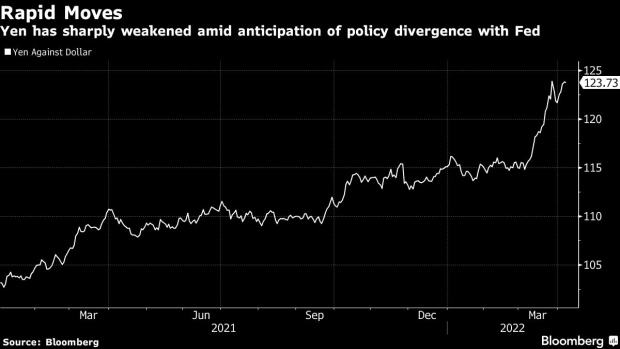Apr 7, 2022
BOJ Is Likely to Adjust Policy as Soon as July, Ex-Official Says
, Bloomberg News

(Bloomberg) -- The Bank of Japan is likely to adjust its control of yields as soon as this summer due to concerns about a weak yen and public discontent over inflation, according to a former BOJ executive director.
The view sharply contrasts with the stated position of Governor Haruhiko Kuroda, who has repeatedly said he will stick with stimulus even as the Federal Reserve and other central banks raise interest rates to tackle inflation. A string of unprecedented bond market interventions backed up his remarks last week.
“They can’t keep doing this for that long,” Hideo Hayakawa, a former director at the bank, said in an interview. “Market participants seem to think the BOJ won’t budge because Governor Kuroda sounds very firm but I don’t think that’s the case.”
Hayakawa’s remarks come after the central bank faced both market pressure on its upper limit on bond yields and a slide in the yen to its weakest level since 2015. While speculation persists among some traders that the BOJ will adjust policy to ensure its stimulus framework in the face of market pressure, most economists don’t expect a policy shift this year.
Without changing its basic framework of monetary easing, the bank may widen its yield target band of 25 basis points either side of zero or shift its targeted yields to those of five years from 10 years, Hayakawa said. The move could take place as soon as the July policy meeting, he said.
A big factor that will spur the BOJ to change policy is the weakening of the yen, Hayakawa said. While the BOJ has repeatedly said the yen is positive for the economy overall, the impact is close to 50/50 and households’ discomfort is set to grow further as inflation picks up in Japan, too, said Hayakawa, who left the bank in 2013.
“It’s too naive for the BOJ to say a weak yen is good when the government is taking measures to address price gains and capping gasoline prices,” said Hayakawa. “An overwhelming majority of Japanese aren’t welcoming the weak yen.”
Summer Elections
Prime Minister Fumio Kishida has ordered his government to compile measures to cushion the economic pain of a rise in oil and daily necessities by the end of this month. It’s critical for him to keep public support in the lead up to elections this summer.
The BOJ should pay close attention to currency levels because its efforts to hold down interest rates are weakening the yen, a senior member of the Japanese ruling coalition party Komeito told Bloomberg.
“The Japanese public will wonder why the BOJ wants to weaken the yen so much” if the bank works hard to cap bond yields while the Fed tries to arrest inflation by tightening, Hayakawa said.
The yen is becoming delinked from economic fundamentals since real effective rates are already down to the lowest levels in decades and the bank shouldn’t seek or try to weaken it more, he said.
“Supporting the yen to depreciate further after it’s already detached from fundamentals isn’t a normal environment,” Hayakawa said. “That sounds crazy to me.”
©2022 Bloomberg L.P.






